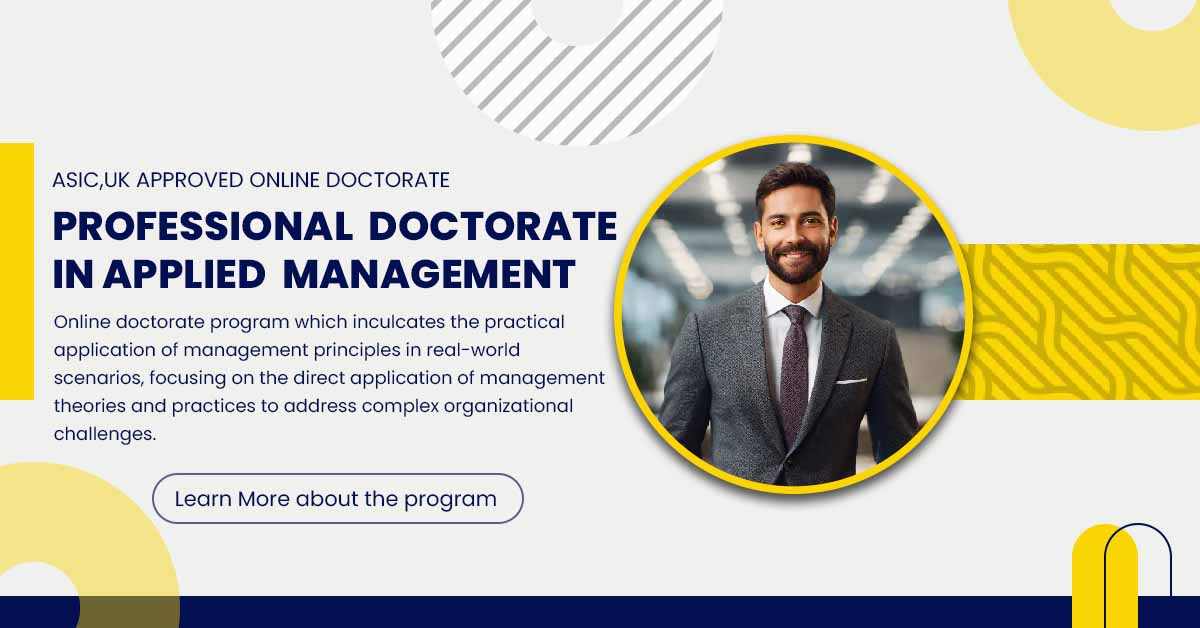The alchemy of concocting a potent blend with the combined effect of Applied Management theories and the instructive role of Professional Doctorate in Applied Management can be equated to the mixture of different metals that generates a material which embodies remarkable durability and versatility. A Professional Doctorate in Applied Management integrates conceptual comprehension and practical expertise to produce exceptional leaders in the world of management. Graduates of Professional Doctorate in Applied Management possess proficient artisanship that involves a combination of theoretical wisdom and practical sagacity that enables them to effectively navigate and tackle intricate organizational challenges with ease. Since the strategic judgement and innovative solutions of future leaders determine the future of organizational performance the Professional Doctorate in Applied Management stands as a roadmap for leaders who are ready to embark on a vocational odyssey in the dynamic landscape of modern business.
Here are some of Applied Management Theories
- Scientific Management Theory
The scientific management theory was introduced by Frederick W. Taylor in the late 19th and early 20th centuries, that aimed at altering the way work was approached. According to Taylor work management could be enhanced with the help of logical analysis and methodical measurement. Time and motion studies were undertaken to discern the most effective ways of executing tasks. In order to eradicated wasteful practices and increase productivity Taylor suggested breaking down intricate tasks into smaller, repetitive steps.
2. Administrative Management Theory
Henri Fayol's Administrative Management Theory, was introduced during the early 20th century, that laid emphasis on the functions of management. Fayol stated that there are five primary functions – planning, organizing, commanding, coordinating, and controlling. He further highlighted the importance of strong organizational framework, a distinct pyramid of authority, and proper communication to achieve organizational goals and objectives.
3. Human Relations Theory
The Human Relations Theory came to existence due to the industrialized outlook of workers in scientific management. Elton Mayo's Hawthorne contributed significantly to this theory during the late 1930’s where he deduced that the performance of employees was determined by numerous social and psychological factors, such as job satisfaction, impetus to work harder, and team relations. This theory highlighted the importance of considering the human element in the workplace and fostering a positive work environment to boost productivity and employee morale.
4. Transactional Leadership Theory
Transactional Leadership theory is very effective for successful organizational management as it emphasizes on formulating clear objectives and expectations for employees and using performance-based rewards and remedial actions to encourage them to accomplish these goals. Transactional Leadership theory works on "quid pro quo" basis where employees are rewarded when they meet the organizational goals and targets but face consequences for failing to do so. Transactional leaders excel at preserving stability and achieving short-term objectives.
5. Total Quality Management (TQM)
Total Quality Management (TQM) theory involves a customer-centric management approach that accentuates iterative advancement within the organization. Total Quality Management (TQM) theory was introduced by W. Edwards Deming and Joseph Juran, that focuses on involving all employees in the process of recognizing and resolving quality issues. By taking regular customer feedback and engaging in continuous learning, organizations will not only improve their quality of service and productivity but also meet the needs of customers more effectively.
6. Theory of Constraints (TOC)
The Theory of Constraints was introduced by Eliyahu Goldratt, who claimed to have detected the most restrictive factor, or restriction, that encumbers the achievement of organizational goals and objectives. The Theory of Constraints emphasizes adjusting the constraint to improve overall performance. By aligning the organization's efforts to mitigate the constraint, managers can improve the overall productivity of the organization and achieve better results.
7. Systems Theory
The Systems Theory interprets organizations an intricate system with interrelated and inter-reliant components. This theory highlights the importance of comprehending the interactions between these components to clasp the organization as a whole. Managers need to understand the correlations between departments, processes, and stakeholders in order to discover prospects for upgrading and improving overall organizational efficiency.
Why Pursue a Professional Doctorate in Applied Management?
The Professional Doctorate in Applied Management plays a crucial role in influencing the future of organizational performance and leadership excellence. This online doctorate degree goes beyond quintessential managerial education, providing experienced professionals with a all-inclusive and specific comprehension of real-world management challenges. By combining theoretical insights from various applied management theories with practical, industry-specific knowledge, Professional Doctorate in Applied Management equips individuals with the aptitude and dexterity to bring forth revolutionary changes within organizations. Graduates of this program emerge as strategic thinkers, capable of analyzing complex organizational issues, and crafting innovative solutions.
Conclusion
These effective theories in applied management as discussed above have played a crucial role in influencing modern management practices. With the constant evolution in the business domain, these theories continue to affect organizations approach to productivity, motivation of workers and organizational performance. Effective managers take the help of the educational crumbs bestowed by a Professional Doctorate in Applied Management along with these applied management theories and integrate their principles to lead their teams towards success in an ever-changing world. Comprehending the historical framework and the evolution of these management theories is crucial for developing a well-rounded approach to management in the modern-day business environment.
Embrace the synergy of applied management theories and the transformative power of the Professional Doctorate in Applied Management. Get empowered with the resourcefulness, intelligence and expertise needed to drive transformative change within your organization. Enroll today for a Professional Doctorate in Applied Management program at ebc.ac and become a catalyst for empowering organizational performance.
Written By : Rajosree Sur


